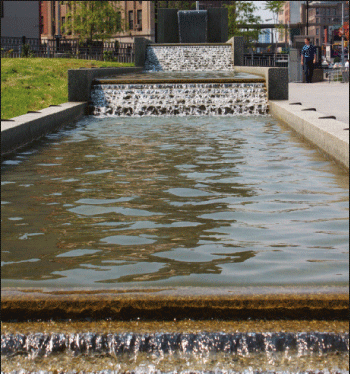By Jared T. Miller
With an abbreviated name that matches its Tribeca surroundings, the recently opened CaVaLa Park has been a welcome addition to the area for those who work nearby.
An abbreviation of Canal, Varick and Laight, the three streets that border the triangle, CaVaLa Park opened quietly on July 20. A Parks Department spokesperson said they hoped to organize a ribbon-cutting ceremony in early September.
The park has not yet attracted a lot of visitors, but it has gotten good reviews so far.
“It surprised me how nice it turned out to be, because I was a little skeptical about the location,” J.D. Marlow, 23, who works nearby on Sixth Ave., said about the park’s proximity to the Holland Tunnel entrance. “It’s going to be a nice little intersection here.”
Local artist Elyn Zimmerman co-designed CaVaLa with Parks Department landscape architect Gail Wittwer-Laird. Zimmerman also designed the memorial for the victims of the 1993 attack on the World Trade Center. She contributed the park’s centerpiece, a fountain resembling a series of cascading waterfalls, which is meant to represent the former canal that used to occupy the area and gave Canal St. its name. The Lower Manhattan Development Corporation contributed $2.4 million to the project, and the remaining funds came from the Mayor’s Office and the Paul and Irma Milstein Foundation to reach the park’s $3.3 million construction cost.
“We were just saying how nice it is,” said Kri Muhammad, 32, who goes to school nearby at the Art Institute of New York City and had stopped by the park with her friend. “With the fountain, it’s a good use of space”
The area was swampland in the mid-1700s. Since then it has served as a canal, been occupied by Crucible Steel Company and, most recently, served as a paved space owned by the Department of Transportation frequently used as parking space for utility vehicles and police cars. In its current form, the park is lined with benches, and features trees, shrubs and seasonal flowers, as well as three stone chess tables.
“I think it totally transforms the area,” said Max Heller, 40, who works nearby, as he ate lunch at one of the park’s chess tables. “It creates an oasis that hasn’t been here in a hundred years.”






































